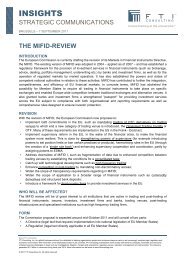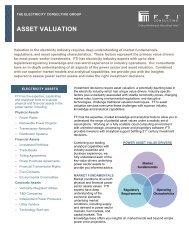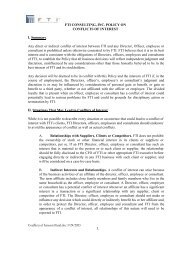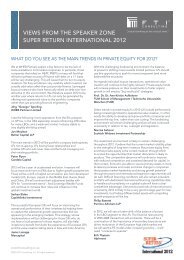Read White Paper - FTI Consulting
Read White Paper - FTI Consulting
Read White Paper - FTI Consulting
You also want an ePaper? Increase the reach of your titles
YUMPU automatically turns print PDFs into web optimized ePapers that Google loves.
Principle 6: For most network-dependent services, the market only wants one.<br />
In the case of eBay, the consumer is better off with the largest auction marketplace possible. Sellers are better<br />
off because they can reach a huge number of bidders and they only have to put their items up for bid in one<br />
place. Equally, buyers are better off because they are more likely to find items they’re looking for at the price<br />
they want in a huge market place with lots of sellers. YouTube is similar. People wanting to share their amateur<br />
creations with others find it very convenient to put their videos on one service that reaches millions rather<br />
than several smaller services. Similarly, people wanting to watch amateur video would rather go to one place<br />
where the videos have been viewed and rated by many other people.<br />
In short, consumer utility is maximized when there is a single service. This is very rare in conventional economics.<br />
In conventional economics, competitors slug it out until two or three winners are left standing. Since<br />
consumers want competitors – at least to ensure there is a check on monopolistic pricing and continued innovation<br />
-- there is always room and a need for a second or third supplier.<br />
These dominant services are very hard to dislodge by competitors. Before Google bought YouTube, it tried to<br />
launch its own video sharing site, as did Yahoo and MSN. They got no takers. The market only wanted one.<br />
Competition and Co-opitition in Network Goods<br />
Barry Nalebuff from Yale and Adam Brandenburger from Harvard wrote the book Co-opitition in 1996 4 . Using<br />
results from game theory they brought to light how competitors can often maximize their position through strategic<br />
cooperation with their rivals – a concept they called “co-opitition”. We’ll first discuss competition among<br />
network goods then look at co-opitition in terms of network compatibility.<br />
Competition<br />
In terms of competition between networks, we want to focus on when consumers switch from one network<br />
good or service to another. In conventional economics, competition rages around benefits and price. Obviously,<br />
consumers are looking for the product with the most benefits and least price. In addition, for some goods<br />
and services, there are switching costs that make it harder to switch brands or services. Conventional economics<br />
has boiled all this down to the following relationship:<br />
Consumers switch to a new product when its benefits exceed its price + switching costs<br />
This means that when the perceived benefits of the product or service exceed its price difference against other<br />
alternatives and the consumer’s other hassles of switching, the consumer is susceptible to switching. (This<br />
doesn’t guarantee they will -- humans are extremely inert. In this sense the role of marketing is to overcome<br />
their inertia.) As an example, a consumer may switch to a Mac from a PC when the perceived benefits of a<br />
Mac (such as better graphics, ease of use and slicker design) exceed the additional price of the Mac and the<br />
hassle of switching all of their files from their old PC.<br />
Network economists have added an additional variable to this switching relationship, which is the gain in network<br />
size when switching. So in network economies, consumers switch when:<br />
Benefits + Network Size Gain > Price + Switching Costs 5<br />
In our previous example of Skype vs. Verizon, a person who originally joined Verizon with 2 million members<br />
might soon realize that they’d be better off joining Skype with its 14 million members, a network size gain of 12<br />
4<br />
Published by Currency Doubleday, 1996<br />
5<br />
Derived from Oz Shy’s The Economics of Network Industries, Cambridge University Press, 2001.<br />
<strong>FTI</strong> CONSULTING | ADVANCED AD OPTIMIZATION RAISES REVENUE AND REDUCES COSTS IN TELEVISION AND RADIO 6
















